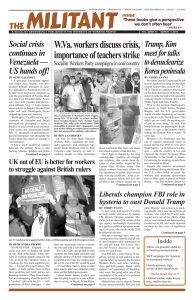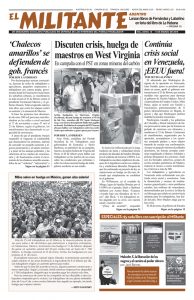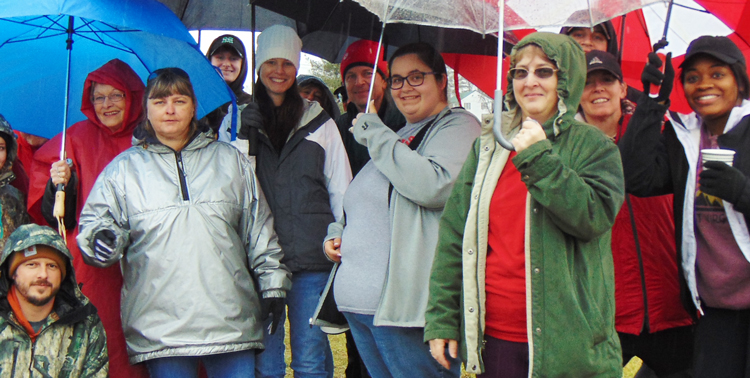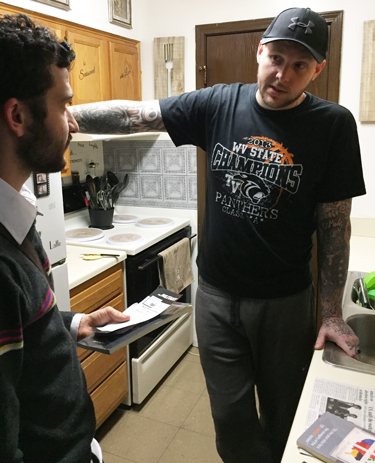 On Feb. 20 Amy Husk, Socialist Workers Party candidate for Kentucky governor, and campaign supporter Samir Hazboun went to West Virginia’s coal country to talk to working people at their doorsteps about conditions they face, and about the school workers strike that day.
On Feb. 20 Amy Husk, Socialist Workers Party candidate for Kentucky governor, and campaign supporter Samir Hazboun went to West Virginia’s coal country to talk to working people at their doorsteps about conditions they face, and about the school workers strike that day.
Their fight is shaped by the long working-class tradition of struggle and solidarity that comes from decades of class battles waged by the United Mine Workers union. The school workers beat back efforts by the legislature to attack their unions and working conditions. After a so-called education reform bill was voted down, the workers stayed out on strike another day, saying they just didn’t trust the government.
In Williamson, in Mingo County, a stronghold of past battles waged by the UMW, Husk and Hazboun talked to Austin Boles, a worker at Food City. “We are living under a dictatorship of the rich,” Husk said, “and workers are paying for their crisis with our health and lives.”
“Oh, I agree with that!” Boles responded. He said he had been born with a heart condition and had three open heart surgeries. Boles said he makes “barely enough to make ends meet.”
“And I hate the pharmaceutical companies,” he added. “They rob working people and get young people hooked on drugs.” He knows a lot of people who overdosed and died because of this.
“Young people suffer horrible despair and alienation because they have nothing to look forward to under capitalism,” Husk said. “If there was a social movement like the fight of the United Mine Workers to defend workers on the job or a mass political movement like the civil rights struggle or the mass mobilizations that forced the U.S. rulers to end their war in Vietnam, young people would see their own power and learn their self-worth. They wouldn’t turn to drugs and suicide like they do today.”
“I agree with that too,” said Boles. He signed up for an introductory subscription to the Militant and said he wanted to keep in touch.
Impact of miners’ battles
SWP campaigners got another picture of the depth of the impact of the miners’ battles as they joined school workers in protests at the West Virginia state Capitol during their strike. Retail workers Glova Scott and Sarah Ullman met Makayla Amos there when they came from Washington, D.C., to show solidarity.
Amos described how her grandfather, who used to work in the mines, loves the teachers’ battles. “One of his favorite things is to drive around and bring coffee to the teachers where they’re picketing,” she said. “In rural areas where we live the schools are often up roads that nobody travels on. So the teachers go to places where people can see them. In Craigsville, where he lives, they go to Rite Aid. Where I live it’s McDonald’s. So he goes out there to bring coffee and solidarity.”
Husk and Hazboun also knocked on doors in Kermit, where they met Eddie McLaughlin, who’s unemployed. When Husk asked what he thought of the West Virginia school workers strike, McLaughlin said he wasn’t sure about their fight.
Husk, who is a health care worker, said a lot of workers “go into teaching or health care because they think they can make a difference, but you learn that the system isn’t set up to help people. Under capitalism, health care is really about profits and the only education the rulers care about is training young people to know their place.”
Hazboun added, “The rich don’t care about educating our kids. They can send their children to the best private schools just like they can pay for the best health care. But they educate our kids to be obedient workers, not independent thinkers.”
“The school workers are standing up to attacks on all our living standards,” said Husk, “They learned important lessons from coal miners’ battles over the years in this region. They reach out to involve the working-class community, to see that kids get food and shelter during their strike so parents can go to work. Their fight shows the way forward to rebuild the labor movement.”
“I agree with that,” said McLaughlin, who used to work as a roof bolter in an underground mine. “It was dangerous work. Everyone in the mines deserves good pay and benefits.”
McLaughlin also served in the army in the Middle East. He described his anger when his daughter died while he was overseas and the military wouldn’t find a way to get him home in time to bury her.
He told Husk and Hazboun that he’d also been in prison. When he got out a lawyer told him it would cost $30,000 to get back his voting rights and his right to carry a gun. “They want to rob me just to get my rights back!” he said.
“We’re fighting in Kentucky to get back the right to vote for those who have been convicted of a felony,” Hazboun said. “They fought and won this in Florida last year.”
McLaughlin got a copy of the Militant to learn more about the SWP and working-class issues.
To join in campaigning with the SWP, or to find out more, contact the SWP or Communist League branch nearest you.



